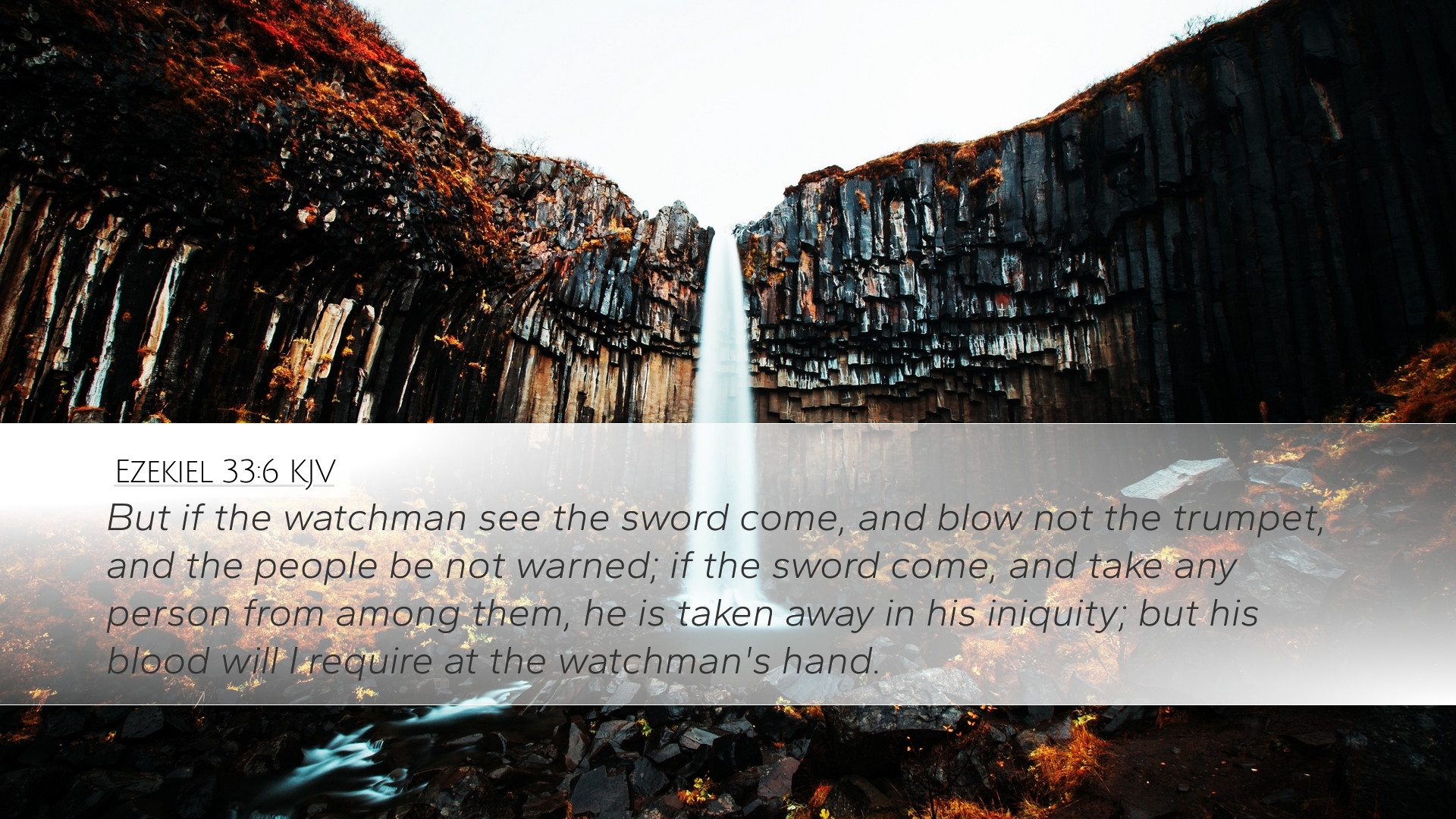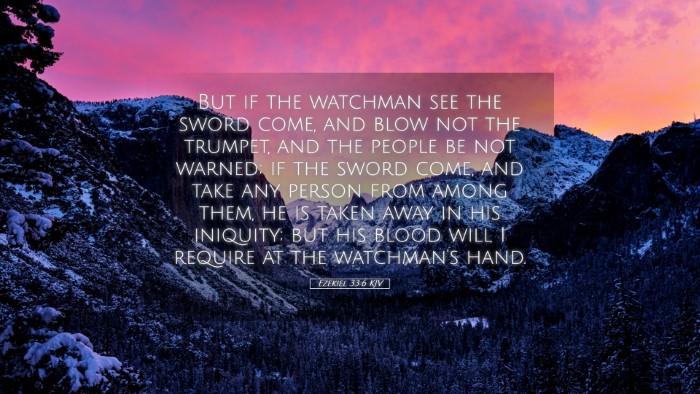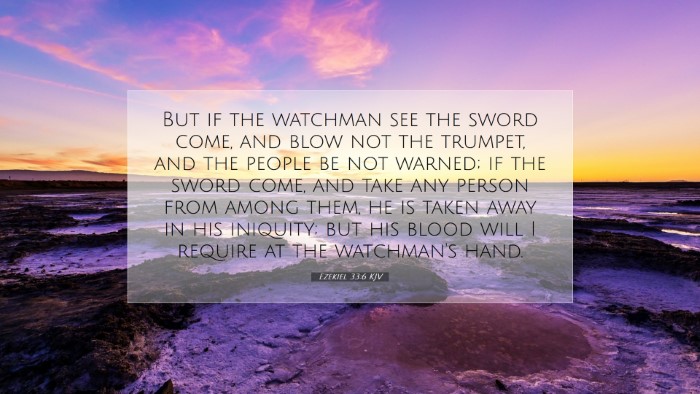Ezekiel 33:6 - Commentary and Insights
Bible Verse: "But if the watchman sees the sword coming and does not blow the trumpet and the people are not warned, and the sword comes and takes any one of them, that person is taken away in his iniquity, but his blood I will require at the watchman’s hand."
Introduction
The verse Ezekiel 33:6 carries profound implications for the responsibilities of spiritual leaders and the nature of accountability within the Christian faith. The metaphor of the watchman serves as a weighty reminder of the duty to warn others regarding impending judgment and spiritual peril. In this commentary, we will explore various insights from renowned public domain commentators such as Matthew Henry, Albert Barnes, and Adam Clarke.
Context of Ezekiel 33
Ezekiel chapters 33 and 34 mark a significant transition in the prophet’s message. Following the fall of Jerusalem, Ezekiel’s role shifts towards a more pastoral orientation, focusing on the call to repentance and the implications of neglecting the divine warnings. Verse 6 emphasizes the culpability of the watchman, echoing themes in prophetic literature about leadership and accountability.
Insights from Matthew Henry
Matthew Henry emphasizes the critical duty of the watchman as a metaphor for spiritual leadership, particularly within the church. He writes:
- The Responsibility of the Watchman: Henry notes that the watchman plays a pivotal role in alerting the people about impending danger. Failure to do so places bloodguilt upon the watchman. This highlights the grave responsibility leaders carry in their spiritual watch over the flock.
- The Nature of Accountability: He stresses that when leaders neglect their duties, they not only endanger themselves but also the souls entrusted to their care. The concept of divine accountability is foundational to understanding the seriousness of spiritual oversight.
- The Urgency of Warning: Henry points out the urgency with which the watchman must act. The impending "sword" represents divine judgment, and if the watchman fails to warn, the consequences are dire both for the individuals and for himself.
Insights from Albert Barnes
Albert Barnes offers a deep exploration of the metaphorical implications of the watchman role, aligning it with the Christian minister’s duties:
- The Minister as Watchman: Barnes views the minister as a prophetic figure, tasked with delivering God’s message. He highlights that the faithful minister must be vigilant, for neglecting warnings may lead to spiritual destruction.
- The Consequences of Inaction: Barnes interprets the "blood" mentioned in the verse as a representation of guilt, suggesting that in failing to warn, leaders share in the responsibility for the consequences that befall the wayward.
- The Ethical Imperative: He emphasizes an ethical imperative for ministers to faithfully declare the whole counsel of God, thus fulfilling their role as watchmen tasked with preserving the spiritual well-being of their congregations.
Insights from Adam Clarke
Adam Clarke provides a more detailed historical background and practical application of the text:
- The Cultural Context: Clarke discusses the historical framework of Ezikel's prophecy during the Babylonian exile, explaining the societal implications of neglect and rebellion against God.
- Spiritual Consequences: He notes that the failure to warn not only impacts physical well-being but leads to eternal ramifications. The importance of spiritual vigilance in a world filled with distractions and moral decay is underscored.
- The Call to Action: Clarke encourages modern-day believers to embrace their role as bearers of truth. The call to warn and disciple others is not just for leaders but for every Christian, reestablishing the priesthood of all believers.
Theological Implications
This verse touches on several critical theological themes:
- Predestination and Free Will: The dual tension of God's sovereignty and human responsibility manifests in Ezekiel 33:6. While God appoints watchmen, individuals still hold responsibility for their responses.
- Judgment and Mercy: The concept of divine judgment is intertwined with the mercy offered through warning. God desires repentance, and the watchman’s role is crucial in facilitating this opportunity for grace.
- Community and Individual Accountability: The watchman metaphor signifies the interconnectedness of faith communities. Each member bears responsibility for encouraging one another in righteousness.
Conclusion
Ezekiel 33:6 serves as a timeless reminder of the weighty responsibility bestowed upon spiritual leaders and individuals within the Christian community. The call to be vigilant and to warn others of both spiritual and moral dangers is essential for maintaining the health of the church and the souls within it. Engaging with the insights of Henry, Barnes, and Clarke allows us to better understand the critical nature of this verse and its implications for our calling as modern-day watchmen in a world often oblivious to the dangers around us.


